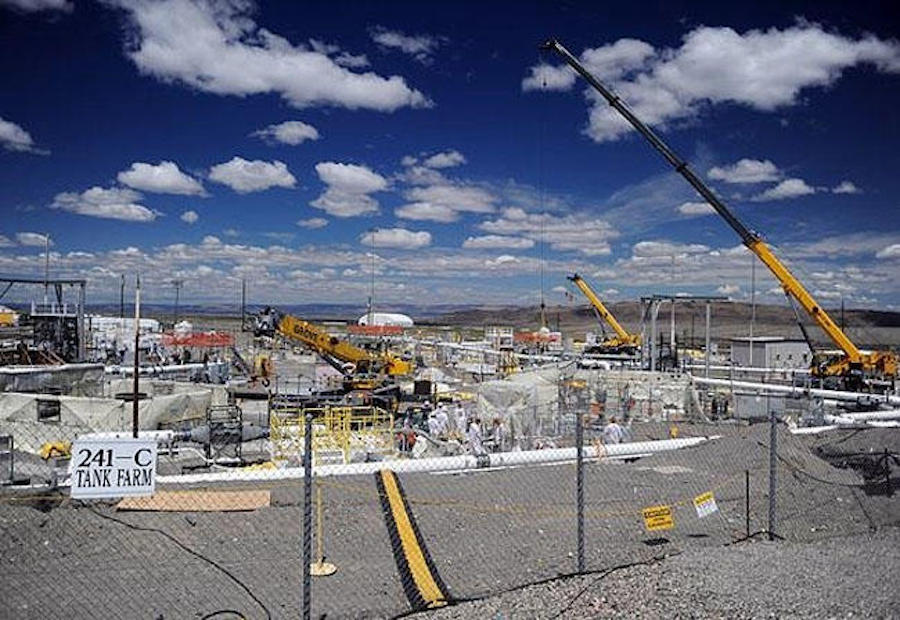Workforce
SCOTUS Hears Feds' Suit Over State Workers' Comp Law for DOE Nuke Site

The U.S. Supreme Court has agreed to review a Washington state workers' compensation law related to federal contractor employees at the U.S. Energy Dept.’s Hanford nuclear waste cleanup site in the state that could potentially cost the federal government tens of millions of dollars a year for decades.
It also could open the door for similar cases over workers' comp eligibility at federal sites in other states. “The practical consequences are far-reaching,” U.S. government lawyers said in court documents.
The 2018 Washington law, HB 1723, says that any present, past or future worker at the Hanford site—which was a key U.S. nuclear weapons production complex dating to World War II and is still highly contaminated—is entitled to workers' comp for any one of hundreds of covered illnesses, without having to show that it was more likely than not caused by employment at Hanford. The illnesses are presumed to be related to work at the site, according to the law.
"Covered diseases and conditions include neurological disease, respiratory disease, beryllium disease, certain cancers and heart problems, if they came about within 72 hours of exposure to fumes, toxic substances, or chemicals at Hanford," say attorneys at Emery Reddy, a Seattle law firm that has handled Hanford workers' comp cases. "Under the 2018 state law, those conditions were presumed to be related to work at the Hanford site unless proven otherwise. Before the law was passed, Hanford employees suffering from an illness had to prove that it was not caused by something else in their lives."
The firm adds that "while exposure to toxic chemicals and radiological exposure are covered conditions for workers compensation, a lack of scientific studies" on the effects of such exposure has made it difficult for certain workers to obtain state benefits.
Taking Sides
The state argues that private contractors operating at Hanford have routinely failed to provide employees with protective equipment and to monitor their exposures to toxic substances. “Their employees often fall ill and are unable to prove the cause of their illnesses,” the state says in stating its case to the Supreme Court. “Washington responded by amending its workers’ compensation laws to help workers at Hanford get benefits, just as the State has done for firefighters, police, and healthcare workers.”
The government, which contends that the law is too broad, filed suit in federal district court in Richland, Wash., in 2018 under the Trump Administration, but that court ruled in favor of the state, as did the federal appeals court in San Francisco lsst August. The Biden government sought Supreme Court review of that decision.
“Any covered Hanford worker—past, present, or future; living or deceased—who worked a single eight-hour shift in a covered area, and thereafter suffers from one of potentially hundreds of covered illnesses, can avail themselves of [the law’s] presumption of entitlement to workers’ compensation,” they argued. HB 1723 applies “for the lifetime” of a covered contract worker and allows reopening of previously denied claims, including by a survivor.
In an appeal last year to President Joe Biden to drop federal opposition, 66 Washington state legislators said the law improves standards for insurance coverage for affected workers.
“Our state residents who suffer from terrible, painful, and debilitating diseases known to be linked to exposure of toxic chemicals were having well-documented difficulties overcoming objections from the federal contractor to access benefits from our state industrial insurance program,” lawmakers said in their letter. Most ill workers are Plumbers and Steamfitters union members in Washington.
The law greatly expands benefits eligibility for a specific class of federal contract workers but it “drastically increases the workers' compensation cost of the firms that employ them,” and has substantial adverse financial consequences for the U.S., the government lawyers argued. They did not explain how it would increase costs to federal contractors.
Coverage can be rebutted by “clear and convincing evidence” such as tobacco use and hereditary factors.
'Impermissable Discrimination'
The government argued that the law violates the U.S. Constitution because it imposes costs on DOE and its contractors not imposed on other employees in the state and because it “directly regulates” the federal government by effectively requiring the department to cover certain ailments including those commonly occurring in the general population, whether or not they were caused by employment at Hanford.
“This impermissible discrimination against the federal government and its contractors and purported direct regulation of the federal government violate the Supremacy Clause,” said the government’s complaint.
DOE is the “statutory employer” for the employees of certain Hanford contractors under a memorandum of understanding with six current prime contractors and seven subcontractors, which employ the majority of Hanford’s 10,000 employees, the complaint said. The document also covers the employees of 61 contractors and subcontractors that previously worked for the federal government at Hanford.
“Since 2009, DOE has paid nearly $116 million in workers’ compensation benefits to employees of Hanford contractors covered by the [memorandum of understanding],” said the government in its argument.
DOE pays workers’ compensation costs directly for most contract workers and reimburses other firms for their costs.
“But even if those arrangements were changed so that the relevant private firms bore the costs of HB 1723 without direct federal reimbursement, the statute would still violate the [Constitution] which prohibits discrimination against the United States and those with whom it deals,” the complaint said.
The U.S. argues that under the appeals court decision, any state within its jurisdiction could enact laws that would require workers at federal sites to be eligible for similar benefits.
This “opens the door to discriminatory state legislation targeting other federal facilities throughout the nation’s largest circuit,” federal government attorneys argue, asking the high court to intervene to forestall the “sweeping implications,” of the lower court decision.





